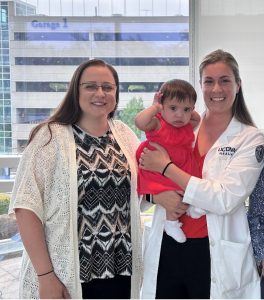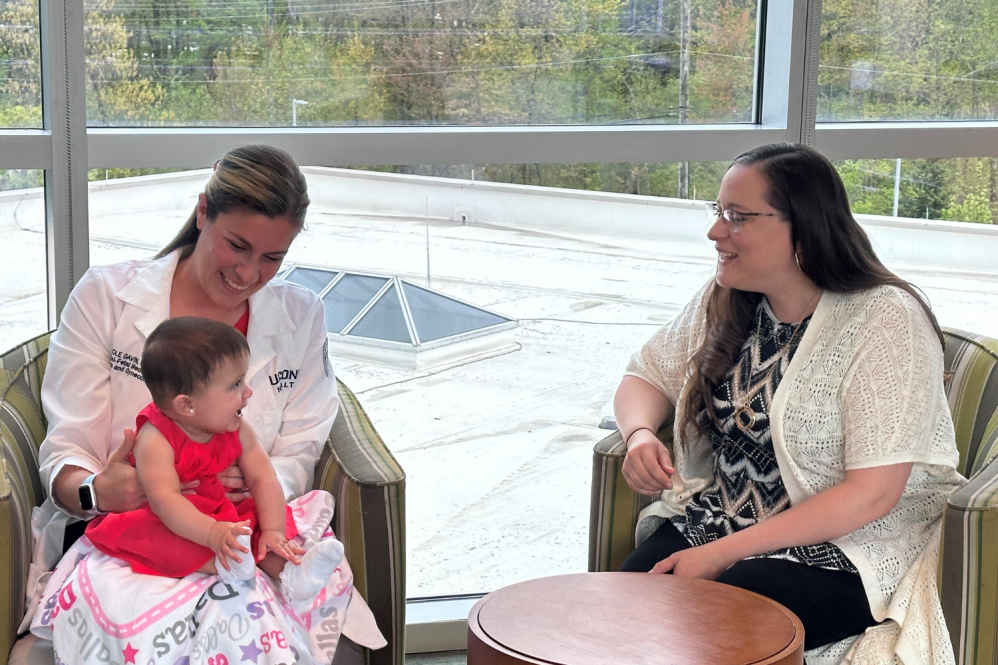Shana Suarez’s son wanted nothing more than a baby sister to care for and protect, but after years of trying, Shana and her husband decided that it wasn’t going to happen; they needed to stop trying and focus on their family.
Shana surprised her husband by taking him to see the Dallas Cowboys play in Texas for his 40th birthday. Little did they know at the time, they were coming home with a forever souvenir, a baby girl they would name Dallas.
Over 35 years old, Shana was considered high risk for pregnancy, and after a concerning blood test, her OB/GYN referred her to a Maternal Fetal Medicine specialist Dr. Nicole Gavin at UConn Health.

Luckily, everything was okay with her baby, but Shana was diagnosed with placenta previa, a condition that occurs when the placenta is over the cervix, and with ultrasound findings that were very concerning for possible placenta accreta spectrum.
Placenta accreta is a serious pregnancy complication when, instead of attaching to the lining of the uterus, the placenta directly attaches to the muscle of the uterus and has trouble detaching at the time of delivery. This can cause extensive, life-threatening bleeding. It’s also becoming increasingly common, rising tenfold since the 1980s.
Those at higher risk for placenta accreta have had uterine surgery, especially previous cesarean deliveries (C-section); the risk increases with the number of C-sections. The placenta position is also a risk factor. If the placenta partially or totally covers the cervix (placenta previa) or sits in the lower portion of the uterus, the patient is at increased risk. Placenta accreta increases with the number of pregnancies, and is more common in women older than 35 or those who have had IVF treatments.
UConn Health’s Maternal Fetal Medicine (MFM) practice specializes in ongoing care and management for women with a history of pregnancy complications or current medical complications. Dr. Gavin specializes in high-risk pregnancies and placenta accreta, and has implemented a screening program at UConn to better diagnose patients prior to delivery.
There is a plan in place before ever stepping foot in the Operating Room. The condition can be seen early on ultrasound as long as the features of placenta accreta are recognized. Prenatal diagnosis is crucial, as it can greatly increase positive outcomes for both mother and baby.
“As part of the screening program, we have implemented a checklist that all the sonographers and attendings use to go through all the markers on the ultrasound that can make us think that there is something abnormal with the placenta – we have had that in place now and anytime we have someone at risk, including anyone with placenta previa or prior cesarean deliveries, we are looking extra closely at their ultrasound,” says Gavin.
Shortly after Shana met Gavin, Gavin herself went on maternity leave and Shana was treated by others on the team in MFM.
“Every doctor I saw made me feel like I was their only patient. What I really appreciated was that they did not sugarcoat anything, they gave me all the information and everything I needed to know in a gentle way, and I always knew I was in good hands,” says Shana. “Coming here was the right choice; I am so appreciative of my doctor at Middlesex Health for telling me there was no better place to be than at UConn Health.”
When Gavin returned from maternity leave, she contacted Shana right away to set up her delivery. In the case of placenta accreta, a C-section followed by the surgical removal of the uterus (a hysterectomy) is often necessary. This procedure, also called a cesarean hysterectomy, helps prevent the potentially life-threatening blood loss that can occur if there’s an attempt to separate the placenta.
“This is a hard discussion we have with patients because while we know patients will do much better if we take the uterus out without ever touching the placenta, it is a considerable life change to have to remove a uterus, so we have a conversation ahead of time to talk about the risks and benefits,” says Gavin.
“Dr. Gavin explained that a hysterectomy was the safest option and, while not an easy decision, I knew it was important that I was around for my children,” says Shayna.

This was a complicated delivery. An incision on the uterus was made away from where the placenta is, and the team safely delivered Dallas. The uterus was closed with placenta still inside before being removed.
“Shana did not need a blood transfusion and she did very well during the surgery, and that is because we have a team of people who are able to diagnose it and know before we go into the operating room,” says Gavin.
“We have our miracle baby,” Shana says. “We waited for her for years, and now she’s here. She’s a huge blessing. I always tell other women, don’t think you are too old or give up, your blessing will come when you least expect it.”
And her son got his wish for a baby sister. He is head over heels for her.
Gavin explains that a multidisciplinary team effort at UConn Health makes for better outcomes: sonographers, MFM doctors, OB/GYN, GYN/Oncology who operate with them, dedicated anesthesiologists, perfusionists, the NICU, and labor and delivery nurses who rotate in addition to operating room nurses, all provide a whole spectrum of care for patients.
UConn Health’s evaluation and management of high-risk pregnancies includes comprehensive care and medical services for mothers and their unborn babies. Maternal-fetal medicine physicians (perinatologists) have undergone advanced training in fetal evaluation and in-utero diagnostic and treatment procedures. They have advanced training in the evaluation and management of mothers with medical conditions that may impact or be affected by the pregnancy.
For more information, contact the Maternal Fetal Medicine Department at UConn Health at (866) 328-8086.

